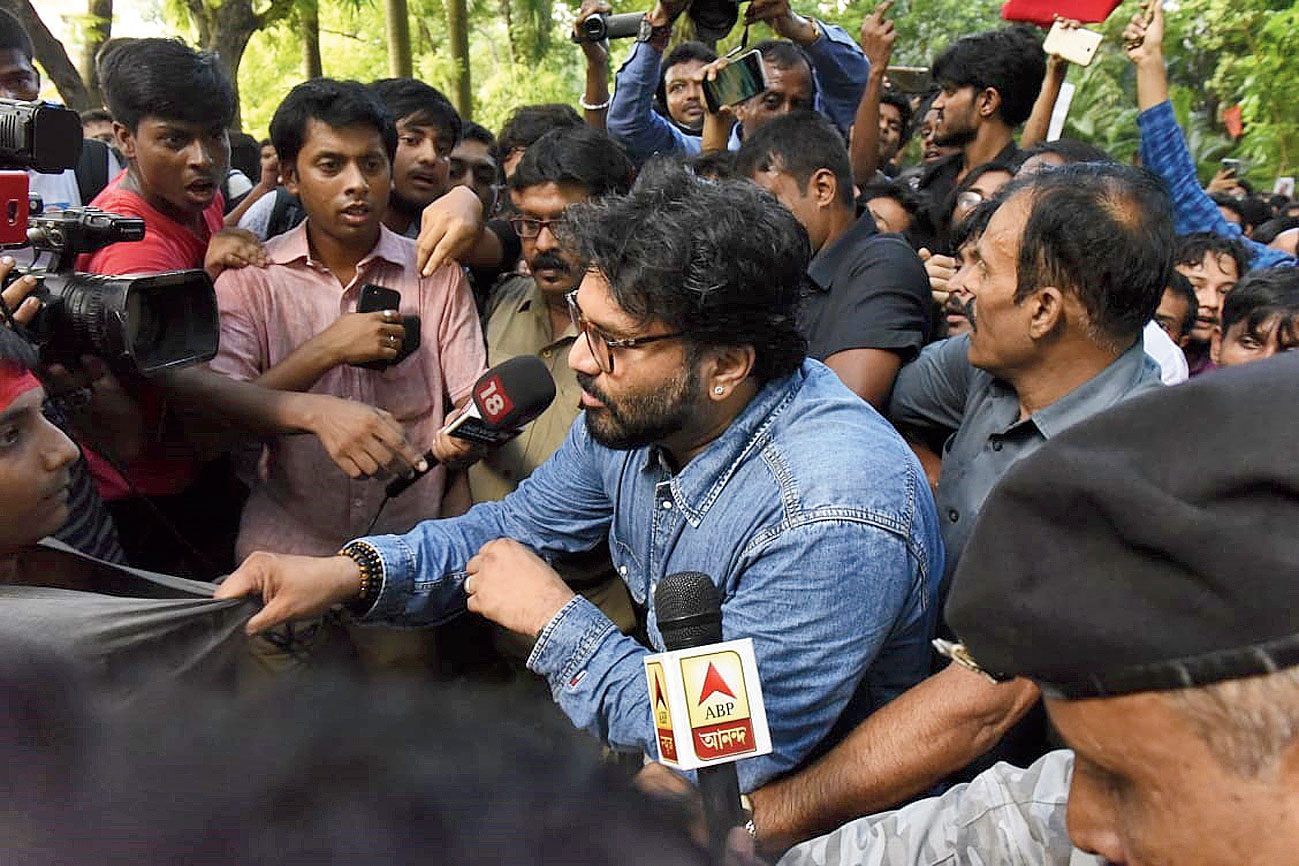Union minister of state for environment Babul Supriyo on Saturday said the editor of The Telegraph had “f***ing sold out” after the journalist refused to apologise for a statement wrongly attributed by the minister to the newspaper.
The minister, who is caught in a controversy associated with his visit to Jadavpur University on Thursday, tweeted on Saturday around 6.30pm: “This is the video which shows: 1. I WASN’T elbowing anyone rather I ws being pushed & manhandled with my shirt torn. 2. It wasn’t a girl either-it was BEARDED GUY as clearly seen in the VDO. If @Telegraph doesn’t apologise tomorrow for their false biased reporting, I’ll sue them.”
The Telegraph could not find any article in the newspaper that said the minister had elbowed anyone.
Around 7.50pm, the minister called The Telegraph editor R. Rajagopal on his mobile phone during the evening news meeting. Supriyo introduced himself and said he would like an “amicable apology”.
‘“What should we apologise for?’ I asked the minister,” the editor recounted.
When the minister referred to the elbow complaint, the editor told him the newspaper had not published any such report and categorically refused to apologise.
The editor told the minister firmly to send a letter or a legal notice, following which established processes could be pursued, especially in the light of the public threat by the minister to sue the newspaper. (This is the established procedure to articulate any concern or complaint.)
Recounting the conversation, Rajagopal said Supriyo construed his categorical assertion as arrogance and reminded him that he was speaking to a “central minister”, to which the editor said it did not make any difference. ‘“Aren’t you a gentleman?’ the minister asked me,” the editor said.
The editor replied: “I am not a gentleman, I am a journalist…. You may be a central minister but I am also a citizen of this country.”
Asked where the newspaper had said the minister had elbowed anyone, Supriyo said it was mentioned along with a front-page picture. The editor said the picture showed the minister grabbing a student by his shirt and that was what the caption had said.
The minister changed his stand and said he was offended by the headline “Babull at JU”. The editor asked the minister what made him assume the headline was referring to him as the line below also spoke of “untamed protesters”.
The editor made it clear no apology would be forthcoming until the minister established what mistake the newspaper had made. In keeping with the established tradition in journalism, the newspaper does apologise when it makes mistakes.
The minister told the editor that he was recording the conversation. The editor asked Supriyo to upload the conversation so that people would know who said what.
The editor said that at one point, the minister asked: “Are you sold out? Are you f***ing sold out?” The minister used at least one more expletive.
The editor said an article would be written about the conversation. The editor disconnected the phone.
A few minutes later, Supriyo tweeted: “Mr Rajagopal, the arrogant editor of @ttindia jst abused me in filthy lingo on the Telephone when I called him asking him 2 print an amicable small apology for falsely publishing a first page report accusing me of grabbing the shirt of a JU student when it’s the other way round.”
The minister added: “He threatened me to hand write an article against me tmrw about me calling him !!!”
Between 6.30pm and 8.30pm, the minister had changed his original complaint about “elbowing” a girl to “grabbing a student’s shirt” and the headline -– all of which are on Twitter. The original tweet threatening to sue the newspaper had not mentioned either the shirt-grab or the headline.
The editor said he did not use a single “filthy” word as alleged by the minister. Several journalists in the newsroom could hear what the editor was saying to the minister.
Since Supriyo said he was recording the conversation, the minister can easily prove — or disprove — his charge by making the entire and unedited recording public.
*********
The Telegraph is publishing this report because the phone call goes far beyond an exchange between two individuals. The call shows how a representative of the government was employing intimidation tactics, cloaked as a request for an “amicable small apology”, to make a newspaper fall in line.











